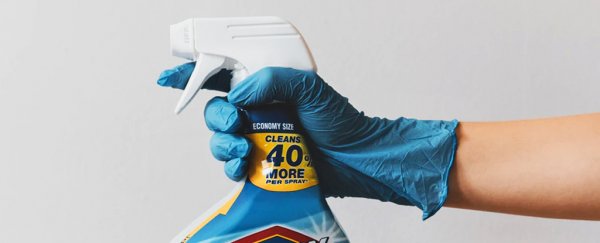There's been a sharp increase in the number of people calling poison control after they have misused bleach while attempting to disinfect their homes, themselves, and their produce from the novel coronavirus, according to a new CDC report.
It comes just over a month after data revealed poison control calls have rocketed at least 20 percent from the previous year – a shift which experts suspected was due to the outbreak of the coronavirus pandemic.
The new survey of 502 adults found that 39 percent admitted to engaging in high-risk activities in an attempt to disinfect their homes. Those activities included washing fruit and vegetables with bleach, intentionally inhaling household cleaners and disinfectants, and applying those products to bare skin.
Most of the participants, of whom a little over half were female and 63 percent were white, were not up to scratch on how to safely store and use toxic cleaning materials.
Only 54 percent said they thought hand sanitizers should be kept out of the reach of children, and only few seemed to know that bleach should not be mixed with ammonia or vinegar, a process that generates gases that could result in serious lung tissue damage when inhaled.
Many respondents still claimed they knew how to clean their homes safely
A quarter (25 percent) of participants reported at least one negative health effect of these unsafe practices, like skin or eye irritation and upset stomach.
But even still, most of the respondents said they knew how to clean and disinfect their homes safely. Fifty-one percent of respondents strongly agreed that they knew how to clean their homes safely, and 31 percent said they somewhat agreed with this assessment.
The CDC wasn't convinced that Americans know how to clean themselves or their homes, and the study authors called for clearer public messaging, not just about what to but about what not to do.
"This survey identified important knowledge gaps in the safe use of cleaners and disinfectants among US adults," the study authors wrote, adding that "the largest gaps were found in knowledge about safe preparation of cleaning and disinfectant solutions and about storage of hand sanitizers out of the reach of children."
They recommended that COVID-19 messaging should emphasise safe practices and warn people about the importance of reading labels, as well as avoiding mixing chemical products.
This article was originally published by Business Insider.
More from Business Insider:
